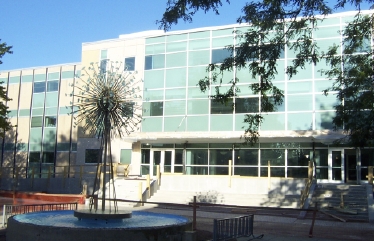Some Pre-Professional Programs
Pre-professional programs:
Links to information about other professions including: physical therapy, nursing, engineering in medicine, and x-ray Technologies.Another useful link:
- UW System Transfer Information System -- for information about transferring course credits between UW institutions, and between Wisconsin Technical College System and UW institutions.
 | |
Detailed information found here
Links of interest:
American Medical Association
Association of American Medical Colleges
National Prehealth
Student Organization
UW-Madison
Medical School
Medical College of Wisconsin
Pre-medicine advisor:
Dr. Pete Mesner,
Biology Dept., 319 Upham Hall, 472-5139, mesnerp@mail.uww.edu
 | |
Typical Requirements for a College of Optometry Admissions
The pre-optometry program requires the following minimum courses:
- English, two semesters (ENGLISH 101 and 102)
- Psychology (PSYCH 211)
- Introductory Biology II: Animal Focus with lab, one semester (BIOLOGY 142)*
*BIOLOGY 142 has a pre-req of BIOLOGY 141 - General chemistry with lab, two semesters (CHEM 102 and 104)
- Organic chemistry with lab, one semester (CHEM 251 and 261)
- Calculus and analytic geometry I (MATH 253)
- General physics with lab, two semesters (PHYSCS 140 and 141) or (PHYSCS 180 and 181)**
**PHYSCS 180 has a co-req of MATH 253, PHYSCS 181 has a co-req of MATH 254
Most Optometry programs also require applicants to have taken the following courses:
- A basic statistical methods course (MATH 230, 231, or 352)
- Microbiology (BIOLOGY 311)***
***BIOLOGY 311 has pre-reqs of BIOLOGY 141, 142, 251, and 253; CHEM 102 and 104
Here is a list of required or recommended courses for several schools of optometry.
See Dr. Pelzel for more specific pre-optometry advising information.
Timetable: Regardless of what major you choose, the required courses listed above should be completed by the end of your junior year. The Optometry Admission Test (OAT) is usually taken near the end of the junior year or just before the senior year begins. The OAT covers quantitative reasoning, reading comprehension, physics, biology, general chemistry, and organic chemistry. The exam is required for admission to any optometry program.
Grade point average: For serious consideration by medical schools, your GPA must be well above 3.0. The mean GPA for all students accepted to medical school is around 3.2.
Optometry School: Admission into optometry school is very competitive. Here is a chart of student profiles showing the admissions statistics for the major optometry schools in the nation.
A good site to find information about Optometry programs is the Association of Schools and Colleges of Optometry. They have links to ASCO Member Schools and Colleges of Optometry Programs.
Links of interest:
American Optometric Association
American Optometric Student Association
Association of Schools and Colleges of Optometry
Worldwide optometry schools
Here are links to the 17 accredited schools of optometry:
Pre-optometry advisor:
Dr. Heather Pelzel, Biology Dept., 157 Upham Hall, 472-5113, pelzelh@uww.edu
 | |
"A dental education opens up a world of professional opportunities. In addition to private practice, today's dental school graduates can choose to work in hospital emergency rooms, conduct advanced laboratory research, teach future dentists or even travel the world with international health and relief organizations." from ADA.org
Links of interest:- American Dental Association
- American Dental Education Association
- Marquette University School of Dentistry
- Online Dental Resource Center
Pre-dentistry advisor:
Dr. Michael Woller,
Biology Dept., 316 Upham Hall, 472-5137, wollerm@uww.edu
 | |
Description
Cytotechnologists are trained to perform microscopic examinations of body cells in order to detect the subtle differences that differentiate normal from neoplastic (cancerous) cells. Physicians rely on the diagnostic abilities of cytotechnologists to detect cancers in their early stages; greatly improving the potential for success in subsequent cancer treatment. Cytotechnologists are employed in hospitals, clinics, and medical laboratories. Experienced cytotechnologists have the opportunity to advance into supervisory positions and into research and teaching.Training
Cytotechnologist training generally involves an intensive 12 month program consisting of lectures, discussions, and practical instruction in microscopy, microscopic pathology, cytogenetics, quality assurance, and laboratory procedures.Typical Cytotechnology Program Admissions Requirements
A baccalaureate degree including a minimum of 20 semester hours in biological sciences, eight semester hours in chemistry, and three semester hours in mathematics. A minimum GPA of 2.5 on a 4.0 scale is required. Favorable consideration will be given to applicants with above average academic record and recommendations. The School of Cytotechnology at the Wisconsin State Laboratory of Hygiene offers a "3+1" program under which a student may be accepted into the school after completing three years of undergraduate course work. The course work must include the minimum requirements listed above and must be completed at an affiliated college or university such as UW-Whitewater.Links of interest:
Wisconsin State Laboratory of Hygiene School of CytotechnologyNaval School of Health Sciences Cytotechnology Program
University of Tennessee - Memphis Cytotechnology Program
Cytotechnology advisor:
Dr. Pete Mesner,
Biology Dept., 319 Upham Hall, 472-5139, mesnerp@uww.edu
 | |
UW-Madison School of Pharmacy
Pre-pharmacy advisor:
Dr. Hephzibah Kumpaty, Chemistry Dept., 231 Upham Hall, 472-1097, kumpatyh@uww.edu
 | |
UW-Madison School of Veterinary Medicine
University of Minnesota College of Veterinary Medicine
Pre-veterinary medicine advisor:
Dr. Ellen Davis,
Biology Dept., 361 Upham Hall, 472-5141, davise@uww.edu
Links to information about other professions relating to Physics and Science
-
American Physical Therapy Association
- Also see the site: How to Be a Physical Therapist
- American Occupational Therapy Association
- American Academy of Physician Assistants
- Nursing Resources Page
- American Association of Physicists in Medicine
- Engineering in Medicine and Biology Society (IEEE)
- X-Ray Technician Degrees and Related Programs X-rays and radiology play a vital role in the healthcare industry. Today's x-ray technology can do everything from spotting small bone fractures to imaging 3-D models of organs. This site lists sites related to careers in radiology.










 UWW United AFT Union
UWW United AFT Union


